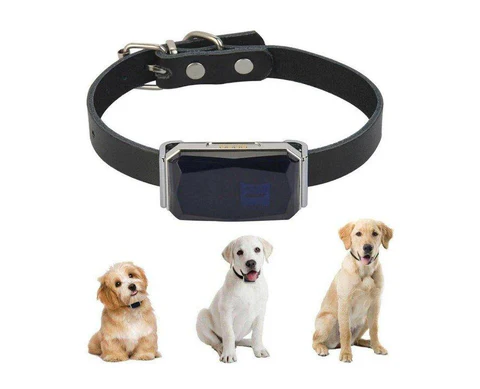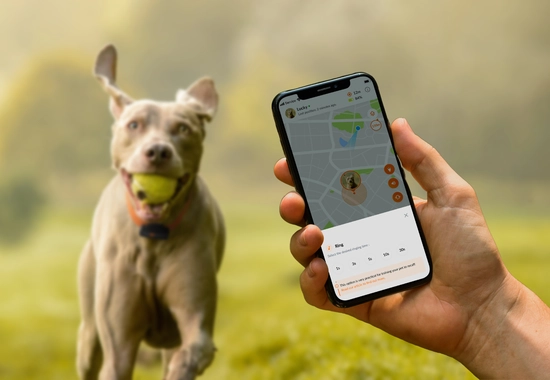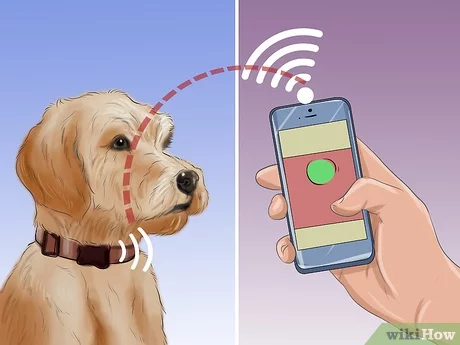Pets are cherished members of our families. We strive to keep them safe and happy, yet even the most well-trained dog might slip out of the yard chasing a squirrel, or a curious indoor cat might dash out the front door. In these situations, a pet tracker can bring invaluable peace of mind, helping you find your wandering friend quickly and safely. But with so many trackers on the market—ranging from GPS collars and Bluetooth tags to radio frequency devices—it can be difficult to decide which one is right for your pet.
In this comprehensive guide, we’ll explore what pet trackers are, the main technologies behind them, key features to look for, and practical considerations such as battery life, size, comfort, coverage area, and subscription costs. By the end, you’ll be well-equipped to choose the best pet tracker for your furry companion’s safety and your own peace of mind.
1. Understanding Pet Trackers and Their Benefits
A pet tracker is a device that attaches to your pet’s collar or harness, enabling you to track their location if they wander off or become lost. This can be particularly useful if:
- Your Pet Is a Wanderer: Some dogs or cats have a knack for escaping fences or slipping out the door.
- You Live in a Rural Area: Pets can roam over large territories, making it harder to locate them without a tracking device.
- You Travel with Your Pet: When pets are away from their familiar surroundings, they may get lost more easily.
- Peace of Mind: Even if your pet rarely strays, a tracker provides reassurance in case of unexpected escapes.
Modern pet trackers often do more than simply show location. Some can monitor activity levels, providing insight into your pet’s exercise or rest, while others may offer health and behavior analytics. But primarily, they’re about safety and location tracking.

2. The Main Types of Pet Tracking Technologies
a) GPS Trackers
GPS (Global Positioning System) trackers use satellite signals to pinpoint your pet’s location. They’re typically paired with cellular networks (2G, 3G, or 4G) to transmit location data to an app on your phone:
- Pros:
- Real-time location tracking, often with high accuracy if the tracker has a good satellite and cellular signal.
- Great for wide coverage areas—some trackers can work nationwide or even internationally depending on the cellular plan.
- Many have geofencing features, sending alerts if your pet leaves a designated “safe zone.”
- Cons:
- Subscription Fees: Most GPS-based trackers require monthly or annual service fees to cover cellular data costs.
- Battery Consumption: GPS can drain batteries quickly, especially if you use frequent location updates or if the tracker struggles to acquire a satellite signal.
- Coverage Limitations: The device needs both satellite view and a compatible cellular network to transmit location data—remote or heavily wooded areas may pose challenges.
GPS trackers are often considered the gold standard for real-time tracking over a wide area.
b) Bluetooth Trackers
Bluetooth trackers, commonly used for keys or wallets, can also be attached to a pet’s collar. They work by pairing with your phone or a user network (like Apple’s “Find My” network if using AirTag, or Tile’s crowd-finding feature).
- Pros:
- No monthly fees (in most cases).
- Affordable initial cost, usually less expensive than GPS trackers.
- Very small and lightweight, comfortable even for small pets.
- Cons:
- Limited range—Bluetooth typically covers up to 30–200 feet (in ideal line-of-sight conditions).
- Not a true “real-time” tracker if your pet ventures beyond Bluetooth range. Some rely on crowd-sourced networks, which may be sparse in rural areas.
- Not as reliable for wide-area searches if your pet is truly lost far away.
Bluetooth trackers may be suitable if your pet primarily stays indoors or within a small radius, and you just want a means of quickly locating them around the house or yard.
c) Radio Frequency (RF) Trackers
Radio frequency trackers have been around for years, using handheld receivers to pick up signals from a collar tag.
- Pros:
- No subscription fees.
- Decent range in certain models (often up to a mile or more, depending on terrain).
- Works in remote areas without relying on cellular networks or GPS satellites.
- Cons:
- Often only directional or approximate location data is provided, not a pinpointed GPS map.
- Bulky antennas or handheld receivers might be less convenient to carry around.
- Some models may have limited accuracy or require learning how to interpret the signal.
RF trackers are especially useful in off-grid scenarios or if you want to avoid monthly fees. However, they often lack real-time “map-based” location updates.
d) Other Hybrid Technologies
Some pet tracker devices combine multiple signals, such as Wi-Fi, GPS, Bluetooth, or even ultra-wideband (UWB) to refine indoor or close-range accuracy. These can be more advanced but may come at a higher price.
3. Key Features to Consider
a) Real-Time vs. Periodic Tracking
- Real-Time Tracking: The device sends location updates every few seconds or minutes, allowing you to follow your pet’s movements on a map. This is crucial in emergencies when actively searching for a lost dog.
- Periodic Tracking: Some devices only update location every 10–30 minutes or on demand to conserve battery. This might suffice if you just need to check up on your pet occasionally.
b) Battery Life
Battery life can range from a few hours (if using frequent GPS updates) to several weeks (for less frequent or simpler technology). Consider:
- How Often Will You Charge? If you prefer minimal hassle, look for a tracker that can last at least a week or more between charges.
- Usage Patterns: If your dog roams freely outdoors, you might want a robust battery that can handle extended real-time tracking if they go missing.
- Battery-Saving Modes: Some trackers have power-saving modes or sleep states when your pet is within a designated safe zone (like your home).
c) Range and Coverage
- GPS Trackers: Check the cellular network coverage in your area. Some trackers rely on 2G networks that may be phased out in certain regions. Others use 4G or multiple carriers.
- Bluetooth: Typically up to 100-200 feet, but can be less with obstacles. Some rely on crowdsourced location from other users.
- RF Systems: Evaluate maximum range claims in open terrain vs. typical real-world environments. Heavily wooded areas or hilly terrain can reduce effective range.
d) Durability and Waterproofing
Pets can be rough on their gear, especially if they love swimming, rolling in mud, or running through bushes:
- Water Resistance: Look for an IP rating or “fully waterproof” assurance if your pet might swim or get caught in rain.
- Shock and Impact Resistance: A robust shell or protective case can help the tracker survive romps outdoors.
- Attachment Mechanism: Ensure the tracker securely attaches to a collar or harness. If it’s prone to falling off, it defeats the purpose.
e) Size and Weight
A large, heavy tracker might be fine for a big dog but could be uncomfortable or cumbersome for a small dog or cat. Check the device’s dimensions and weight. Some trackers weigh under 1 ounce, which is suitable even for most felines. Others weigh several ounces and are better for medium or large dogs.
f) Activity Monitoring and Other Extras
Some trackers do more than just location tracking. Activity monitoring can track your pet’s steps or approximate calories burned. Others may have:
- Geo-Fencing: Let you define virtual boundaries and send alerts if your pet leaves or enters them.
- LED Lights or Sound: Helps you locate the collar in low-light conditions or call your pet’s attention.
- Health Insights: Some advanced trackers analyze sleep and rest patterns, providing clues about potential health issues.
While these extras can be useful, consider if they justify the added cost or complexity. Location reliability is still the primary function of a pet tracker.

4. Subscription Costs and Fees
Many GPS-based trackers require a monthly or annual subscription for cellular data. Costs vary widely:
- Basic Plans: $5–$10 per month for location tracking.
- Premium Plans: $10–$20 per month, potentially offering extra features like activity data, worldwide coverage, or faster tracking intervals.
Before purchasing, confirm the tracker’s data plan details. Some offer flexible plans if you only want coverage for certain months (e.g., during traveling), while others require annual commitments. Weigh these ongoing fees against the benefits of real-time GPS location.
5. Setup and User-Friendliness
a) App Interface
Most modern trackers come with a smartphone app to view your pet’s location on a map, set geofences, and adjust settings. Look for:
- Clear, Intuitive Design: A complicated interface can hamper quick usage in emergencies.
- Notifications/Alerts: Does it send push notifications if your pet leaves a safe zone or if the battery is low?
- Accuracy: Some apps have advanced features like route history or sharing capabilities (useful if multiple family members need access).
b) Pairing and Calibration
Check how complicated it is to set up. Some trackers require initial calibration or manual pairing with your phone. Others might need a short walk with your dog to establish a stable location baseline. Ensure the process is well-documented and that customer support is available if needed.
c) Additional Requirements
- SIM Card: Some GPS trackers come with an embedded SIM, while others require you to obtain a SIM from a compatible network.
- Firmware Updates: The best devices can receive updates to improve performance or fix bugs—confirm how these updates are delivered (OTA updates via the app is typical).
6. Evaluating Accuracy and Reliability
a) Environmental Factors
GPS accuracy can be affected by:
- Tall buildings or dense urban canyons.
- Heavy tree cover in forests.
- Bad weather or satellite alignment.
If you live in a city with skyscrapers, a GPS device might occasionally show inaccurate positions. Similarly, heavily wooded areas can degrade satellite signals.
b) Backup Locating Methods
Some advanced trackers switch to Wi-Fi or Bluetooth signals if GPS is weak, or rely on an accelerometer to estimate movement. Having a fallback method can be beneficial, but it varies by device. Check user reviews or manufacturer claims about coverage reliability in different terrains.
c) Real-World User Feedback
Online reviews, especially from owners in similar regions or with similar pets, can reveal how effectively a given tracker performs in everyday conditions. Look for consistent praise for reliability, as well as any recurring complaints about dropouts or inaccurate location pings.

7. Considering Your Pet’s Comfort
a) Collar or Attachment
The tracker typically attaches to a collar or harness. Some come as an integrated collar system, while others are separate modules you clip on. If your pet already has a favorite collar, ensure the device is compatible with it. Or you may need to switch to the custom collar provided by the manufacturer.
b) Weight and Bulk
We touched on this earlier, but it bears repeating: heavier or bulkier trackers can annoy smaller pets or cause them to scratch or paw at the device. If the tracker is too large for a cat or a small dog, they may resist wearing it. Carefully verify weight specs and recommended pet size.
c) Daily Wear or Occasional?
Some trackers are meant for continuous wear (with daily or weekly recharging), while others might be used only during walks or trips. If you plan to keep it on 24/7, ensure the device is durable, safe, and comfortable around the clock, and that you have a plan for quick recharging or swapping out devices.
8. Durability and Build Quality
Pets can be rough on gear—scratching, chewing, or rolling around in dirt. The best trackers are built to withstand everyday pet antics:
- Material: Hard plastic or rugged rubber housings typically last longer than thin plastic shells.
- Sealed Ports: If the USB charging port or SIM slot is exposed, water or dirt can infiltrate. Check for well-sealed compartments.
- Warranty: Some brands offer warranties covering manufacturing defects or water damage. It’s worth checking coverage details, especially for pricey devices.
9. Branding, Reviews, and Customer Support
a) Known vs. Niche Brands
Reputable pet tech companies often have more robust testing and software updates. They also typically offer better customer support if you experience connectivity or hardware issues. However, smaller or newer brands might offer competitive features at a lower price—just be sure to do your research.
b) Trial Periods and Return Policies
Ideally, choose a tracker from a brand with a clear return policy if you discover it doesn’t meet your needs (e.g., inaccurate coverage in your area or battery life is insufficient). Some companies may offer a 30-day or 60-day satisfaction guarantee.
c) Community Feedback
Beyond professional reviews, check community forums (e.g., subreddits about pets, brand-specific Facebook groups) to see real user feedback on battery life, reliability, and how promptly the manufacturer addresses issues.

10. Cost vs. Value
a) Upfront Price
Prices for pet trackers can range from $20 (basic Bluetooth tags) to $300 (advanced GPS collar systems). Consider your budget, but also weigh how critical it is to find your pet in an emergency.
b) Ongoing Subscription Fees
For cellular-based GPS trackers, you might spend another $5–$15 per month or more. Over the device’s lifespan, these costs add up. If you prefer no monthly fees, an RF or Bluetooth tracker might be more appealing (though with trade-offs in range or real-time data).
c) Replacement and Upgrade
Trackers have a limited lifespan, especially if they rely heavily on rechargeable batteries. In 2–3 years, you might consider replacing or upgrading. Factor this into your cost expectations.
11. Tips for Successfully Using a Pet Tracker
- Test the Tracker at Home: Practice using the app, geofence settings, and location updates in your neighborhood. Ensure you’re comfortable with the interface before an emergency arises.
- Keep It Charged: If the battery dies when your pet actually escapes, the tracker is useless. Develop a routine: for instance, charge it every night, or have two trackers so one can charge while the other is worn.
- Check Fit Regularly: Collars loosen or slip. Confirm the tracker remains secure but not too tight, avoiding chafing.
- Update Firmware/Apps: Accept updates from the manufacturer. They often enhance accuracy or add new features.
- Combine with ID Tags/Microchips: A tracker is an extra layer of protection, but a microchip and collar ID tag remain essential. If the tracker fails or is lost, the microchip ensures vet clinics and shelters can identify your pet.
12. Potential Downsides or Limitations
While pet trackers are incredibly helpful, it’s worth acknowledging limitations:
- Not a Replacement for Training: Relying solely on a tracker can’t prevent your dog from roaming or your cat from slipping out. Basic training and a secure environment are still crucial.
- Signal Loss: GPS or cellular signals can drop in remote places. Trackers do best with at least moderate coverage.
- Delay in Updates: If your pet is running rapidly, some trackers can’t keep pace with real-time updates. There might be a short delay.
- Possibility of Device Loss: If a collar breaks or your pet somehow removes the tracker, you could lose the hardware.
- Battery Constraints: A battery can fail at the exact moment you need it most if you don’t recharge regularly.
Understanding these factors ensures realistic expectations.

13. Special Considerations: Cats vs. Dogs
Cats are often smaller, more agile, and more likely to slip into narrow spaces or climb. This means:
- Lightweight is crucial.
- If your cat is strictly indoors, a simple Bluetooth tracker might suffice to find them if they hide.
- Outdoor cats that roam might require a GPS device if they regularly go beyond your yard.
Dogs vary widely in size. Large dogs can handle bigger trackers, while toy breeds need something ultra-light. Consider the dog’s lifestyle—do they love water or long hikes? Then choose a robust, waterproof device with strong battery life.
14. Real-World Scenarios
To help imagine how these features play out, consider:
- An active suburban dog who frequently runs off chasing squirrels: A GPS tracker with geofencing alerts is ideal, letting you know the moment they leave the yard.
- An indoor-only cat known for hiding in random places: A small Bluetooth or RF tracker can help you locate them around the house without paying for a monthly subscription.
- A farm dog living in rural areas with patchy cell coverage: An RF tracker might outperform a cellular-based GPS if coverage is sparse, though you lose the convenience of map-based real-time tracking.

15. Conclusion
Choosing the best pet tracker ultimately revolves around where your pet roams, how quickly you need location updates, your tolerance for monthly fees, and your pet’s comfort. For wide-range coverage and real-time accuracy, a GPS tracker with cellular service is typically the most robust choice. If you live in an area with poor cellular reception, or want to avoid subscriptions, consider an RF tracker. For smaller pets or purely indoor use, a lightweight Bluetooth device might suffice.
Key factors include battery life, comfort/size, coverage reliability, durability, subscription costs, and ease of use—both the physical device and its companion app. Do your homework, compare models, and read user experiences focusing on real-world performance in environments similar to yours. A good pet tracker will serve not only as a safety net if your pet strays but also as a daily reassurance, letting you track their adventures (or naps) with peace of mind.
Whichever route you choose, pairing a pet tracker with basic precautions—like microchipping and proper ID tags—ensures the best chance of reuniting with your furry friend quickly if they ever wander off. After all, our pets are family, and safeguarding their well-being is worth every effort.
